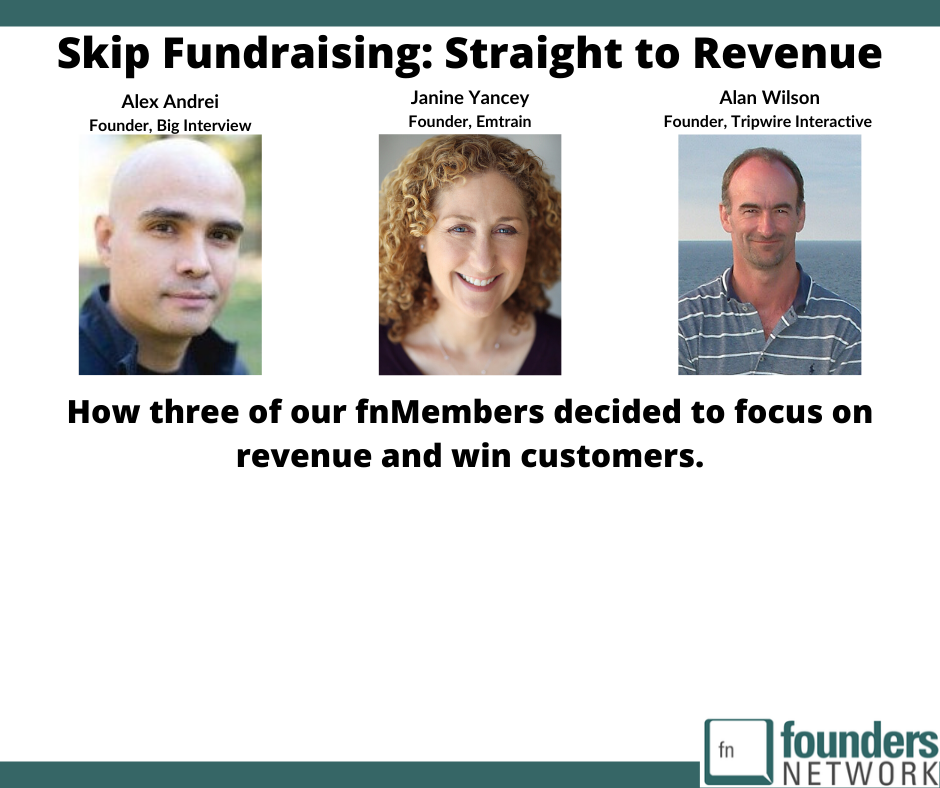
Miles T. Bird is a mentor and speaker within our global ecosystem of founders. To receive peer mentorship from Matthew and over 600 fellow Tech Founders, please request an invite and join our global network.
In a practice session with Miles T. Bird of Tuesday Capital, several founders took turns pitching their startups. Miles provided feedback for each of them, some of which was common amongst their pitches. Here are some of the most important points he made for each founder.
The First Presenter’s Feedback:
- Always start your pitch with the problem statement & solution off the bat & close with your experience/history. (i.e.“This is for that”, “uber for doctors”)
- Eliminate any use of the word actually from your pitch.
- Explain what you’re doing up front and get the problem up front.
- Your pitch should focus on quantifying exactly why and how you are relevant to the team and why the company is relevant (i.e. the company drove in x amount of revenue, increased x by y).
The Second Presenter’s Feedback:
- It may be more helpful if can provide more examples. Condense your problems into one simplified statement: a one sentence line that would resonate with a kindergartner (use b2b, cloud, online) – using the investor’s language.
- Make sure you get to where the business is today and then get into background at the end.
- Don’t focus so much on the impact that your pitch turns into fluff.
- Social impact should be self evident and focus in on why the team is such a strong team. It could be displayed as an unfair advantage for an early stage company. Show that you can hire employees because of your social impact (if this applies).
The Third Presenter’s Feedback:
- I loved the enthusiasm and the closing statement.
- I would work on getting rid of any umms & ahhs
- Define terms that are essential to the understanding of the problem (i.e. more about what collective action is).
- Put the round & fundraising goal you’re at at the end of your pitch
- If you have more than 2-3 minutes – dig into your story
- With a short pitch time, focus on the story, problem & why you’re excited and also convey credibility
- Convey where the business is today briefly
Q: Should people discuss competitors in their pitch?
A: Only use if there’s a way to convey why there’s an opportunity (aka competitors that are perceived to have total market share)
The Fourth Presenter’s Feedback
- There is some disconnect between the problem statement and the solution
- Make sure the problem is a relatable problem to the community and is big and widespread rather than siloed to yourself or your community (personal problem versus the problem that everyone is stuck in their phone and it’s increasing depression, suicide, etc.)
- Make sure your solution clearly answers the problem
- Instead of saying “okay so why are we doing this?” say “we are doing this because…” – make sure you don’t sound scripted.
The Fifth Presenter’s Feedback
- Take the ego out & just have one founder present. Later you can introduce the other founder but just have one person pitch.
- It’s important you focus on solving the problem rather than focusing on categorizing (yoga marketplace rather than health tech)
- Don’t explain things you don’t know (cool *insert tech name*) don’t do that unless you know what *tech name* is.
The Sixth Presenter’s Feedback
- You typically have a short time with an investor – ex briefly at an event
- 3 minute pitch
- Last thing an investor wants is a 3 minute turbo speech that’s super rehearsed, they just want a natural conversation
- Always have the confidence. It’s really nice when founders articulate where they’re at using investor, fundraising, founder language. (pre-launch, beta users, pre-product market fit, scale, etc.).
- Put up front where you are from a business traction standpoint and then explaining where the metrics are resonates with the investors.
Key Takeaways:
1) Focus on order of pitch
2) Energize yourself – go into the bathroom & put your hands up. Conveying excitement is super important
3) First rule of sales is to get someone to say yes to something small
Q: What drove you to invest on Tuesday Capital’s last investment?
A: Multiple things
- There was a problem we could identify with.
- It was priced appropriately (many in SV are overpricing their valuation).
- There was a warm intro from a known contact
- Serial & divergent successful career path






